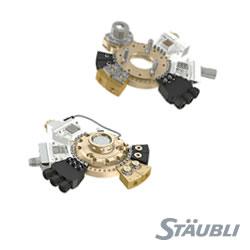Operation Lifetime Doubles in Smart Meters and Other Wireless Sensor Node Applications with New Wireless Transceiver from STMicroelectronics
ST's SPIRIT1 wireless transceiver cuts power budget by 50% over competing devices
Geneva, April 26, 2012 - STMicroelectronics, a global semiconductor leader serving customers across the spectrum of electronics applications and a world leader in smart metering and industrial applications, today introduced a high-performance, ultra-low-power wireless transceiver for Automatic Meter Infrastructure and other wireless sensor node applications, such as alarm and security systems, home and building automation, and industrial monitoring and control. ST\'s SPIRIT1 transceiver combines excellent receiver sensitivity with unbeatable current consumption, delivering 50% power reduction over existing solutions in the market.
ST\'s SPIRIT1 transceiver handles the communication between smart meters in households and businesses and the neighborhood data concentrator, which relays the information to the utility provider control center. By enabling short-range transmissions in frequency ranges below 1 GHz 1, SPIRIT1 ensures proper wireless signal propagation through concrete walls and building structures.
Power consumption is a critical parameter in battery-powered wireless metering applications. SPIRIT1 delivers an unparalleled competitive advantage of extremely low current consumption, slashed by as much as 50% over existing solutions in the market. This enables SPIRIT1-equipped applications to be in operation for up to twice the time of other solutions without the need to replace batteries.
SPIRIT1 boasts an outstanding receiver sensitivity of -120dBm. This allows the designer to lower the output power of the transmitter and thus further decrease the overall current consumption, while maintaining a highly robust communication channel. The transceiver supports advanced technologies like frequency hopping, auto-acknowledgment and antenna diversity to secure error-free data transmission even in harsh-environmental or challenging-logistical conditions.
Additional embedded features include 128-bit data encryption, error correction and detection, FIFO memory blocks, as well as highly flexible and programmable data packet management, which contribute to reducing the computation load of the host microcontroller and the overall system cost.
ST's SPIRIT1 Sub-GHz RF transceivers are currently available for sampling to lead customers. The resale price will be $1.8 for 1,000 pieces. For further information on availability and pricing please contact your ST sales office.
About STMicroelectronics
ST is a global leader in the semiconductor market serving customers across the spectrum of sense and power technologies and multimedia convergence applications. From energy management and savings to trust and data security, from healthcare and wellness to smart consumer devices, in the home, car and office, at work and at play, ST is found everywhere microelectronics make a positive and innovative contribution to people\'s life. By getting more from technology to get more from life, ST stands for life.augmented.
In 2011, the Company's net revenues were $9.73 billion. Further information on ST can be found at www.st.com.
Featured Product

